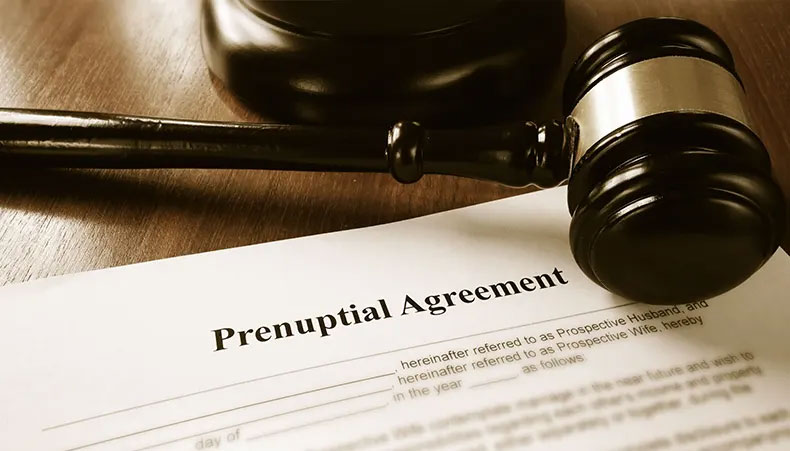
Obtaining a prenuptial agreement might cause anxiety in some soon-to-wed couples. It has long been assumed that having one set up indicates that a couple's marriage is all about money. Attorneys for family law in Georgia understand that being requested to sign one does not always imply that this is the case.
A prenuptial agreement (sometimes called an "antenuptial agreement" or a "premarital agreement") is a contract between two individuals who are seeking to tie the knot. The goal is to define each party's rights in the case of a divorce. Property distribution clauses upon death are sometimes included, but such provisions are better suited in a will. The most typical purpose for a prenuptial agreement is to avoid separate property (property possessed by one spouse prior to the marriage) being divided between the spouses in the case of divorce.
Prenuptial agreements are used by engaged couples to preserve their assets and provide for the other following divorce. If your partner asks you to sign a prenuptial agreement, remember that, as unromantic as it might seem, you have the right to an attorney and an equitable arrangement. It is an opportunity to safeguard oneself in case the unforeseen occurs.
Many couples have various reasons for setting up prenuptial agreements. One of the most typical reasons for signing one is to protect businesses, valuable property, inheritances, or assets acquired before the marriage. A prenuptial agreement protects either partner from sharing or losing assets or property they’ve owned prior to their marriage.
Divorce is not something anyone wants or anticipates. However, responsible spouses should be ready for the unexpected. Premarital agreements typically make marriages stronger, just as certain insurance policies make your financial life more secure, or at least have the ability to do so. Money is by far the most common source of marital discord. It doesn't matter if you're barely scraping by or if you're flush with cash. Money is removed from the equation with premarital agreements. As a result, these conflicts have no potential of causing harm to your relationship.
Prenuptial agreements are extremely prevalent among Millennial couples in this area. Many of these individuals witnessed their parents' divorces. As a result, they are frequently willing to think outside the box in order to strengthen their relationship.
In the case of a divorce, prenuptial agreements are sometimes used to restrict, create, or remove alimony. Prenuptial agreements usually do not address child custody or child support. Judges are still in charge of making ultimate custody judgments. Because no one can forecast all of the conditions that will exist at the time of a custody dispute, custody must be determined at the time of the conflict (not when a prenuptial agreement is formed).
Furthermore, couples cannot predetermine child support because the law considers child support to be a right of the child, which the couple to be married cannot override.
Yes. By having an attorney draft an amendment to the original agreement, you can "re-up the prenup." Once properly signed and witnessed, it forms part of the original agreement and reflects any new terms or amendments.
A section in most well-written prenuptial agreements specifies how to cancel the arrangement. Furthermore, some prenuptial agreements provide for automatic cancellation after a specified number of years.
Yes. Each party should have their own individual lawyer who can explain the planned arrangement as well as the possible risks in the event of a divorce. An attorney can make adjustments to the planned prenuptial agreement that will have a significant impact on what occurs in the case of a divorce.
Pre and post-nuptial agreement attorney Sharon Jackson can prepare an agreement depending on your specific needs, whether you are married or intending to marry. She can provide invaluable advice and legal assistance to guide you in reaching an agreement with the opposite party. If necessary, she can provide legal services to ensure that the agreement's provisions are followed
Call our office now at (678) 909-4100 to schedule your consultation.
Attorney Sharon Jackson LLC
175 Langley Drive, Suite A1
Lawrenceville, GA 30046
Phone: (678) 909-4100